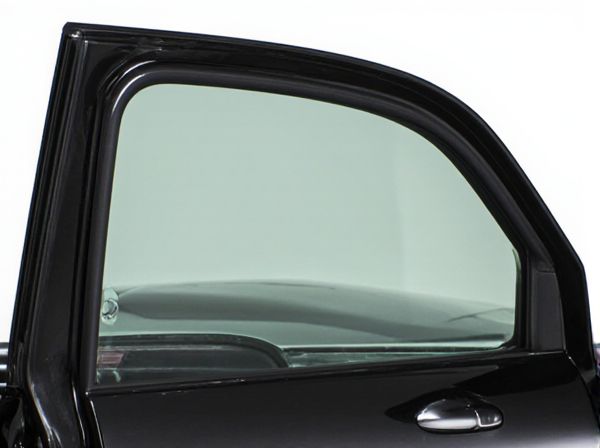
Photo illustration: Privacy Glass vs Solar Control Glass
Privacy glass offers enhanced opacity to prevent visibility and maintain confidentiality, making it ideal for private spaces like bathrooms or offices. Solar control glass reduces heat and glare by filtering sunlight, improving energy efficiency and comfort in homes and commercial buildings. Your choice depends on whether you prioritize privacy or effective solar heat management.
Table of Comparison
| Feature | Privacy Glass | Solar Control Glass |
|---|---|---|
| Primary Purpose | Enhances interior privacy by darkening windows | Reduces solar heat and blocks UV rays |
| Heat Reduction | Moderate heat reduction | High heat rejection, improves cabin comfort |
| UV Protection | Offers basic UV blocking | Blocks up to 99% of harmful UV rays |
| Visibility | Reduced outward visibility due to tint | Clear visibility with minimal tinting |
| Appearance | Dark, tinted look for privacy | Usually clear or lightly tinted |
| Cost | Generally less expensive | Typically higher cost due to technology |
| Legal Restrictions | Subject to tinting laws and regulations | Complies with most regulations, less restricted |
Introduction to Privacy Glass and Solar Control Glass
Privacy glass, commonly known as frosted or tinted glass, enhances confidentiality by obscuring visibility while allowing natural light to pass through, often used in offices and vehicles. Solar control glass reduces solar heat gain by filtering infrared and ultraviolet rays, improving energy efficiency and occupant comfort in residential and commercial buildings. Both types of glass integrate functional technologies that optimize light management and thermal regulation.
Key Features of Privacy Glass
Privacy glass features a specialized tint or coating that reduces visibility from the outside while maintaining clear vision from the inside, enhancing confidentiality for vehicle occupants or building interiors. It effectively blocks UV rays, reduces glare, and helps maintain cooler interior temperatures without compromising natural light. Unlike solar control glass, privacy glass prioritizes visual obscuration over thermal insulation, making it ideal for applications requiring discretion and privacy.
Key Features of Solar Control Glass
Solar control glass is designed to reduce heat gain by reflecting and absorbing solar radiation, thereby enhancing energy efficiency in buildings. It typically features a low-emissivity coating that minimizes ultraviolet (UV) rays and reduces glare without compromising natural light transmission. This glass type helps maintain indoor comfort by controlling temperature fluctuations and lowering cooling costs, making it a practical choice for climate control compared to privacy glass, which primarily focuses on obscuring visibility.
How Privacy Glass Works
Privacy glass works by incorporating micro-louver technology or electrochromic layers that limit visibility by controlling light transmission and reflection, creating a one-way view effect or darkened surface. This technology prevents outsiders from seeing inside while maintaining natural light flow, often used in vehicles and architectural applications for enhanced confidentiality. Unlike solar control glass, which primarily reduces heat and UV rays, privacy glass focuses on obscuring visibility without significantly compromising daylight.
How Solar Control Glass Functions
Solar control glass functions by utilizing a special coating that reflects and absorbs a significant portion of solar radiation, reducing heat gain inside buildings while allowing natural light to pass through. The technology minimizes ultraviolet (UV) and infrared (IR) rays, thereby enhancing energy efficiency and maintaining indoor comfort. Unlike privacy glass, which obscures visibility for privacy purposes, solar control glass primarily focuses on thermal regulation and glare reduction without compromising transparency.
Applications of Privacy Glass
Privacy glass is widely used in automotive and architectural applications to enhance confidentiality and prevent visibility while maintaining natural light transmission, making it ideal for office partitions, conference rooms, and residential windows. Unlike solar control glass, which primarily focuses on reducing heat gain and UV radiation, privacy glass provides visual obstruction without compromising aesthetics. Its applications extend to bathroom windows, medical facilities, and retail storefronts where discretion and style are crucial.
Applications of Solar Control Glass
Solar control glass is widely applied in commercial buildings, residential homes, and automotive windows to reduce heat gain and enhance energy efficiency by filtering ultraviolet and infrared rays. It is particularly effective in large glass facades, skylights, and curtain walls where controlling solar radiation minimizes cooling costs and improves indoor comfort. Compared to privacy glass, solar control glass prioritizes thermal regulation while maintaining transparency for natural daylight and exterior views.
Privacy Benefits: Privacy Glass vs Solar Control Glass
Privacy glass enhances confidentiality by limiting visibility from the outside while maintaining natural light inside, making it ideal for secure environments. Solar control glass primarily reduces heat and UV radiation transmission, offering minimal privacy advantages. Choosing privacy glass ensures effective concealment for residential or commercial spaces without compromising on daylight.
Energy Efficiency: Solar Control vs Privacy Performance
Solar control glass significantly enhances energy efficiency by reducing solar heat gain, lowering cooling costs and maintaining indoor comfort. Privacy glass primarily focuses on obscuring visibility without substantially blocking heat or sunlight, offering limited energy-saving benefits. Choosing solar control glass optimizes both thermal regulation and glare reduction, while privacy glass prioritizes occupant confidentiality over energy performance.
Choosing the Right Glass for Your Needs
Privacy glass offers enhanced opacity, making it ideal for spaces that require discretion and protection from prying eyes, while solar control glass emphasizes reducing heat and glare by filtering ultraviolet and infrared rays. Choosing the right glass depends on your primary needs: privacy for sensitive environments or energy efficiency for sun-exposed areas, as solar control glass contributes to lower cooling costs. Consider factors such as location, lighting preferences, and thermal insulation requirements to ensure optimal performance and comfort.
 caratoz.com
caratoz.com